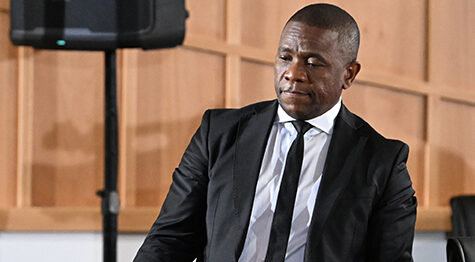The opening session of Parliament’s Ad Hoc Committee investigating allegations made by KwaZulu-Natal police commissioner Lt-Gen Nhlanhla Mkhwanazi got off to a heated and chaotic start.
Members of parliament (MPs) clashed over whether the committee had an Mkhwanazi’s original statement before them.
EFF leader Julius Malema objected to Mkhwanazi taking oath, arguing that they only have a “supplementary statement” before them which might indicate it is rather a copy submitted to the Madlanga commission, which is probing the same allegations.
“We are not a junior committee of the commission. There is no statement of general Mkhwanazi before us. There is a statement to the commission and therefore, in the absence of his statement to the Ad Hoc Committee of Parliament, on which basis do you want him to take an oath?
Commission’s statement can’t be used
“You know chair, that a supplementary statement should be supplementing the original affidavit if you wish to say so. There is no such and therefore, general Mkhwanazi is not proper before us and this legal team has failed us because in the deliberation, we made it very clear, if colleagues are honest with each other, we repeatedly said we cannot use the statement of the commission,” said Malema.
The committee heard from the chief evidence leader, Advocate Norman Arendse SC, in the previous meeting that the statement from Mkhwanazi would be original and that the statement to the Madlanga commission would be attached as annexture.
Malema emphasised that the legal team should not take decisions on behalf of the committee, highlighting that they should not have decided on their own that the statement would be referred to as the supplementary statement.
“You want to use a material that has been used and sourced by a commission established by the executive in this separate arm of the state? It is wrong, it is unconstitutional, we have to do things properly and the proper is [that] there must be an original statement to us as an Ad Hoc Committee. If there so wish to be a supplementary statement, let it be,” said Malema.
He emphasised the importance of Parliament having its own statement, saying even if it was a copy and paste of his previous statement but serving as an original one for Parliament would have been suitable.
Evidence leader defends statement
Arendse said the statement has been presented and is only called a supplementary statement because much of factual background was extensively covered by the Madlanga commission evidence leaders.
“At the Madlanga commission, general Mkhwanazi gave evidence under oath, although his statement was not declared under oath. Judge Madlanga administered the oath and he gave his evidence under oath.
“It would therefore be surprising that his evidence before us today would differ materially from the evidence that he has already given before the Madlanga commission.
“I acknowledge what honourable Malema is saying about us not playing second fiddle to the commission but the fact of the matter is this: after parliament decided to appoint this Ad Hoc Committee and the appointment of ourselves was finalised, the Madlanga commission had also been proclaimed by the president and their evidence leaders got hold of Mkhwanazi first,” said Arendse.
He said the supplementary statement avoids repetition of what he has previously presented. Arendse said what will be found different is that there is more engagement in relation to matters that are part of their specific terms of references.
Arendse confirmed that the statement before Parliament is original but acknowledged after a back-and-forth that they should not use the word “supplementary”.
Call for adjournment
David Skosana, uMkhonto weSizwe (MKP) chief whip, called for an adjournment to discuss the matter and have the evidence leaders correct their mistake.
“We are again letting the country down, it’s like we don’t know what we are doing. We know where we come from in this country, we had a case where somebody was sentenced without trial before the judge.
“Today we are finding ourselves in this again where we are told that the statement was done, the oath was taken in the Madlanga commission. It is unacceptable,” said Skosana.
Sibonelo Nomvalo, MKP MP serving as an alternate to the committee, said he does not have confidence in the Madlanga commission so their work should not be imposed on the committee.
Technical team is misleading
“We said the doctrine of separation of powers is very clear on the role that should be played in terms of the constitutional mandate by each organ of the state. Today, we find ourselves in a situation where we are being misled by the technical team or by the legal advisors of this committee.
“If you say we must rely on the statement of the Madlanga Commission, you are simply subjecting the constitutional responsibility of parliament in this regard. Let’s avoid this thing of mentioning Madlanga, Madlanga, Madlanga,” said Nomvalo.
ANC MP Xola Nqola and Inkatha Freedom Party (IFP) supported the proposed adjournment of the proceedings until the matter was resolved.
Chairperson Soviet Lekganyane confirmed that the two institutions are different and their materials should serve original.
He was shut down when he attempted to ask Mkhwanazi if he did submit an original statement on basis that Mkhwanazi should not respond to anything before taking oath.



